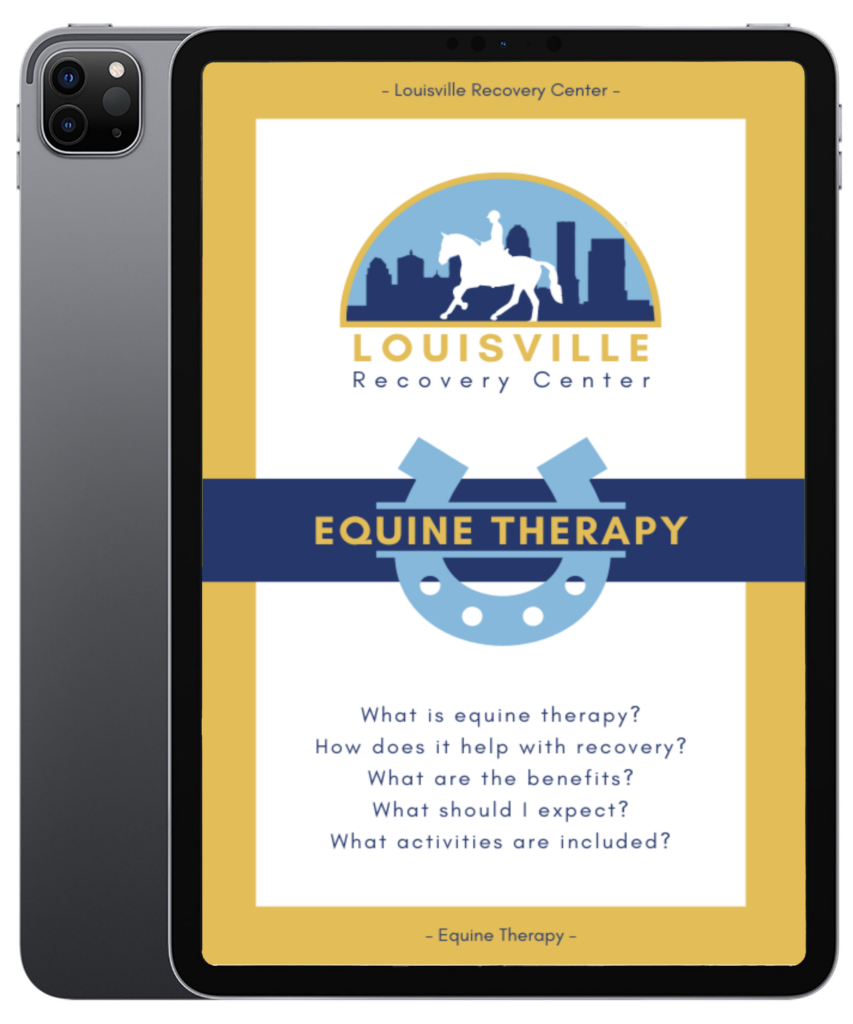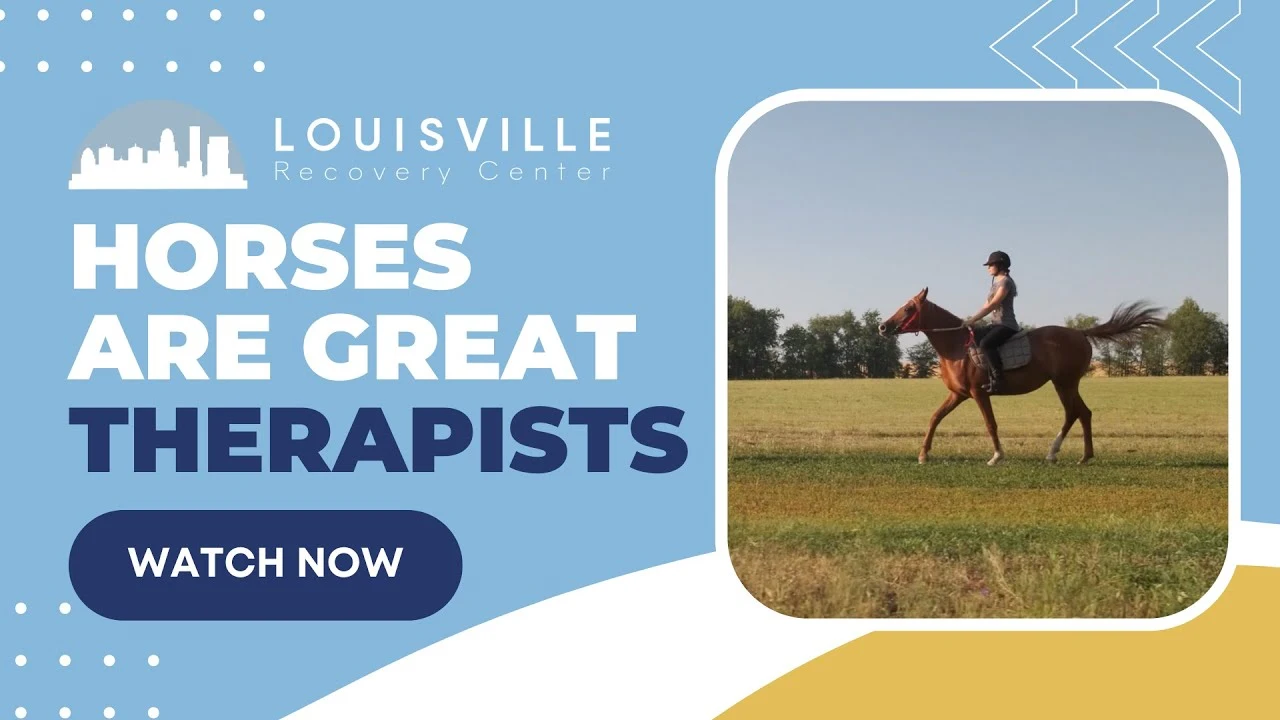Equine Therapy In Louisville
at Louisville Recovery Center
Equine Therapy In Louisville
The use of horses in therapy, known as equine therapy, has become a popular form of treatment since its inception. Individuals with a range of health problems seek mental relief, behavioral change, and spiritual empowerment through this therapy, especially those struggling with addiction.
The equine therapy treatment center’s horses are cared for, fed, and groomed by the patients. The therapy itself, however, is grueling work and not a simple pleasure ride. Because horses are intelligent animals, establishing a connection with them takes trust and effort. A horse cannot be abused and then simply accept it. The suffering individual, therefore, must accept responsibility as a result of the horse’s expectations. This responsibility, in all likelihood, is something they’ve been missing in their life.

Fill Out This Quick Form To Download Our FREE Equine Therapy eBook
History of Equine Therapy in Louisville
The use of horses as a therapeutic treatment has been around for thousands of years. In ancient Greece, literature from as far back as 600 B.C. describes horseback riding as a cure. Poliomyelitis patients in Scandinavia were treated with therapeutic horseback riding in 1946. North America’s first therapeutic riding group, CARD (Community Association of Riding for the Disabled), was established in 1960.
For those with disabilities, therapeutic horseback riding was introduced as a method of recreation and motivation. Other animals are also used in therapy, but horses are the most popular thanks to their prompt feedback. Horses are both big and intimidating, which makes it necessary to gain their confidence while trusting them not to harm them.

How Does Equine Therapy Work in Louisville?
There are several equine treatment sessions that do not include direct contact with the horse. Instead, equestrian therapists lead the groups or individuals around the horse during treatment. Before the session begins, they will establish a goal and outline the purpose of the exercise. Among other things, they may harness, muck a stall, lead a horse in a pen, or clean a hoof with a horseshoe pick. Those without experience with horses are led by the equine handler, who may participate in three-way relations between the handler, horse, and client until the client forms a strong bond with the therapy horse.
The treatment goals are established by the therapist during the trip, and the session is structured to facilitate emotional and spiritual healing for the clients. Clients may be asked to lead a horse to a destination, while the others observe and take notes, for example. Drug abuse and other behavioral problems may be addressed using cognitive behavioral therapy (CBT), play therapy, or storytelling in addition to equine-assisted therapy. For example, people with anxiety may be assisted by mindfulness training using the horse as a prompt to discuss what anxious signals the horse provides, as horses are naturally anxious around unfamiliar people.
Benefits of Equine Therapy in Louisville
There are many ways in which equine therapy can be beneficial, but building relationship skills is especially helpful. Working with a horse to build trust teaches skills necessary for day-to-day interaction with others. Some benefits of equine therapy include:
- Emotional regulation – Addiction therapy uses equine therapy to teach addicts how to manage their feelings. Because addicts often act violently and aggressively, it is crucial for them to learn to regulate their emotions in recovery. Equine therapy is an ideal tool for this. Working with a horse one-on-one, a person must build a relationship. They will be able to assess the horse’s mood, tone, and body language in order to express themselves in a healthy way. The person can then learn to be less hostile and build trust with the horse based on the information.
- Confidence and Sense of Purpose – During therapy sessions, working with a horse can give recovering addicts a sense of purpose. As their relationship with the horse develops, they may bond with, and even love it. Working with an equine can be a new experience for some recovering addicts, who may learn to be more vulnerable in this process. As the clients become more and more involved in the horses’ lives, their sense of purpose increases. When clients develop a heightened sense of self-esteem and confidence, they are able to control their addictions more easily.
- Healthy boundary-setting – A horse’s physical space needs may be as simple as understanding how much space he requires. Without saying a word, horses let you know when you’ve overstepped their boundaries. Trying to control or dominate a horse won’t work, and an aloof or passive approach can make it harder to lead them. This effectively shows clients the importance of establishing healthy boundaries for themselves moving forward.
- Developing communication skills – People with addictions and mental health issues are often emotionally underdeveloped. They may find it difficult to connect or bond with other people. However, they are able to bond with horses. Working with horses helps people recognize their behavior with others. Horses are excellent communicators, but they cannot speak. Learning to recognize horse behavior can help people better understand the impact their behavior has on others.

Who Benefits the Most From Equine Therapy?
Working with horses can benefit almost anyone, but it is especially beneficial for those in addiction recovery. Those with depression or anxiety are also especially benefitted from equine therapy. People with these issues usually lose confidence and retreat to isolation. Therapy with horses can help these individuals become more open and work on controlling their impulses. A horse is a living mirror, so they provide immediate feedback in interactions. Individuals struggling with the following disorders could also benefit greatly from participating in equine therapy:
- Post-traumatic stress disorder (PTSD)
- Behavioral problems
- Eating disorders
- Attention deficit hyperactive disorder (ADHD)
Is Equine Therapy Right for Me?
Working with and around horses can help you learn or relearn how to trust yourself and others. Through the healing process and how you respond to the animal’s emotions, you can learn more about yourself and how to build relationships with others. If you are considering an equine therapy treatment program, these are some of the advantages you may enjoy.
In the field of addiction treatment, equine-assisted therapy is a newer approach. Through working with horses, addicts may develop verbal communication abilities, build trust, gain vulnerability, and develop self-confidence as part of experiential therapy. Recovering addicts are able to see how their emotions impact their personal relationships as they build connections with horses. Because they are excellent at identifying and responding to human emotions, horses are used in treatment. In addition to caring for their horses, recovering addicts will increase their self-confidence as they take on additional responsibilities. When used in conjunction with other addiction treatments, equine-assisted therapy can play a significant role in the road to sobriety.
Equine Therapy at Louisville Recovery Center
We believe that equine therapy provides an excellent method for helping you establish a better connection with your emotions and gain a better understanding of your behavior patterns. Horses are impartial creatures without desires or expectations, and we believe that they are an excellent way to help you become more aware of your emotional state and gain a better understanding of your behaviors, patterns, congruence, boundaries, and barriers to recovery. Call Louisville Recovery Center today to learn more about our equine therapy program! We are here to assist you with overcoming addiction in any way we can.

